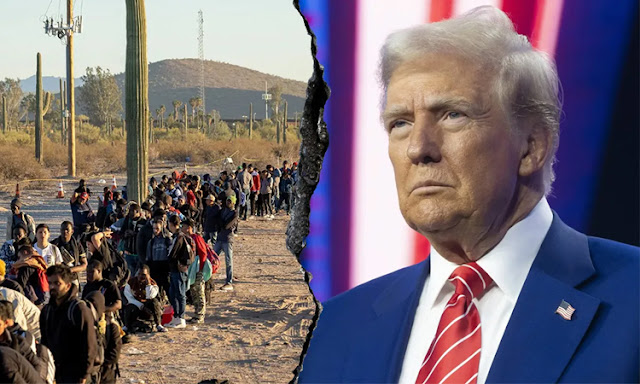In a significant legal development, a U.S. appeals court has ruled against former President Donald Trump’s attempt to invoke a wartime-era law to facilitate mass deportations of undocumented immigrants. The decision, handed down by a three-judge panel of the U.S. Court of Appeals for the District of Columbia Circuit, marks a critical moment in the ongoing national debate over immigration policy, executive authority, and the use of historical statutes in modern governance. This ruling has far-reaching implications for the Trump administration’s immigration agenda, the legal boundaries of executive power, and the broader discourse surrounding immigration enforcement in the United States. Below is a detailed exploration of the case, its legal underpinnings, the arguments presented by both sides, the court’s reasoning, and the potential ramifications of the decision.
Background of the Case
The case centers on Trump’s attempt to use the Alien Enemies Act of 1798, a wartime statute, to justify large-scale deportations of undocumented immigrants. The Alien Enemies Act, originally enacted during the Quasi-War with France, grants the president broad authority to detain, relocate, or deport non-citizens from countries with which the United States is at war. The law was historically used during times of declared conflict, such as World War I and World War II, to address national security concerns involving foreign nationals. However, Trump’s legal team argued that the law could be applied in the context of modern immigration enforcement, particularly to address what they described as an “invasion” of undocumented immigrants at the U.S. border.
The Trump administration’s rationale for invoking the Alien Enemies Act rested on the claim that the influx of undocumented immigrants constituted a national security threat equivalent to wartime conditions. By framing the situation at the U.S.-Mexico border as an “invasion,” the administration sought to bypass traditional immigration enforcement mechanisms, which are typically governed by the Immigration and Nationality Act (INA) and other contemporary laws. The use of the Alien Enemies Act would have allowed the administration to implement expedited deportations without the procedural safeguards afforded under modern immigration law, such as hearings before immigration judges or access to legal representation.
The policy was met with immediate resistance from immigration advocates, civil liberties organizations, and legal scholars, who argued that the application of a 225-year-old wartime law to address a domestic policy issue was both legally dubious and constitutionally problematic. Critics contended that the Alien Enemies Act was never intended for use outside of declared wartime scenarios and that its invocation represented an overreach of executive power. The American Civil Liberties Union (ACLU), along with other plaintiffs, filed a lawsuit challenging the policy, arguing that it violated due process rights, the separation of powers, and the principles of equal protection under the law.
The Legal Challenge
The lawsuit was initially filed in a federal district court, where plaintiffs sought an injunction to halt the Trump administration’s use of the Alien Enemies Act. The district court ruled in favor of the plaintiffs, issuing a preliminary injunction that blocked the policy from taking effect. The Trump administration appealed the decision to the U.S. Court of Appeals for the D.C. Circuit, a court with a reputation for handling significant cases involving federal authority and constitutional law.
The three-judge panel, composed of Judges Patricia Millett, Cornelia Pillard, and Justin Walker, heard arguments from both sides. The plaintiffs, represented by the ACLU and other advocacy groups, argued that the Alien Enemies Act was inapplicable to the current situation because the United States was not engaged in a declared war with any nation. They further contended that the administration’s attempt to equate undocumented immigration with an “invasion” was a mischaracterization that lacked legal or factual grounding. The plaintiffs emphasized that the use of the law would result in widespread violations of due process, as it would allow for deportations without adequate judicial oversight or individualized assessments of immigrants’ cases.
The Trump administration, represented by attorneys from the Department of Justice (DOJ), countered that the president has broad authority to address national security threats, including those posed by illegal immigration. They argued that the Alien Enemies Act’s language was sufficiently flexible to encompass modern challenges, such as the large-scale migration of undocumented individuals. The administration pointed to historical precedents, such as the internment of Japanese Americans during World War II, as evidence of the law’s applicability in times of perceived crisis. They also asserted that the executive branch’s interpretation of the law was entitled to deference under principles of administrative law.
The Court’s Ruling
In a unanimous decision, the D.C. Circuit upheld the district court’s injunction, ruling that the Trump administration’s use of the Alien Enemies Act was unlawful. The court’s opinion, authored by Judge Millett, systematically dismantled the administration’s arguments, emphasizing that the law’s scope was limited to situations involving declared wars or explicit acts of hostility by foreign governments. The court found that the administration’s attempt to apply the law to undocumented immigration was a misinterpretation that stretched the statute beyond its intended purpose.
The court’s reasoning rested on several key points:
Historical Context of the Alien Enemies Act: The court noted that the Alien Enemies Act was enacted in a specific historical context, during a period of heightened tension between the United States and France. The law was designed to address threats posed by foreign nationals from hostile nations during times of war, not to serve as a general tool for immigration enforcement. The judges highlighted that the law’s text explicitly refers to “enemies” and “war,” terms that do not apply to undocumented immigrants who are not affiliated with a foreign government engaged in hostilities against the United States.
Lack of a Declared War: The court underscored that the United States is not currently at war with any nation from which the targeted immigrants originate, such as Mexico or Central American countries. The administration’s claim that the border situation constituted an “invasion” was rejected as a rhetorical exaggeration that lacked legal merit. The judges pointed out that immigration challenges, while significant, do not rise to the level of armed conflict or hostility required to trigger the Alien Enemies Act.
Due Process Concerns: The court expressed concern that the use of the Alien Enemies Act would deprive undocumented immigrants of their constitutional right to due process. Under modern immigration law, individuals facing deportation are entitled to certain protections, including the right to a hearing before an immigration judge and the opportunity to present evidence in their defense. The Alien Enemies Act, by contrast, allows for summary deportations without such safeguards, a practice the court deemed incompatible with contemporary constitutional standards.
Separation of Powers: The court also addressed the broader issue of executive overreach. The judges noted that the Trump administration’s attempt to repurpose a wartime statute for domestic policy purposes circumvented Congress’s authority to regulate immigration through the INA and other statutes. By attempting to bypass the legislative framework, the administration was effectively rewriting immigration law, a function reserved for Congress.
Historical Precedents and Moral Considerations: The court acknowledged the historical use of the Alien Enemies Act, particularly during World War II, when it was used to justify the internment of Japanese Americans. However, the judges emphasized that this precedent, widely regarded as a moral and legal failure, did not support the administration’s position. Instead, it served as a cautionary tale about the dangers of misusing wartime powers to target vulnerable populations.
The court concluded that the Alien Enemies Act could not be lawfully applied to the current immigration context and affirmed the district court’s injunction. The ruling effectively halts the Trump administration’s plan to use the law for mass deportations, at least until further legal proceedings or a potential appeal to the U.S. Supreme Court.
Implications of the Ruling
The D.C. Circuit’s decision has profound implications for immigration policy, executive authority, and the broader political landscape. Below are some of the key consequences and considerations arising from the ruling:
1. Limits on Executive Power
The ruling reinforces the judiciary’s role as a check on executive power, particularly in the realm of immigration policy. By rejecting the Trump administration’s attempt to invoke a wartime law for domestic purposes, the court reaffirmed the principle that the executive branch cannot unilaterally reinterpret statutes to expand its authority. This decision aligns with other recent court rulings that have constrained Trump’s immigration policies, such as those related to the travel ban, the border wall, and the “public charge” rule.
The case also highlights the judiciary’s willingness to scrutinize claims of national security as a justification for expansive executive actions. The court’s rejection of the “invasion” narrative suggests that future attempts to invoke wartime powers for non-war purposes will face significant legal hurdles.
2. Impact on Immigration Policy
The ruling is a victory for immigration advocates who have long argued that mass deportations violate due process and humanitarian principles. By blocking the use of the Alien Enemies Act, the court ensures that deportation proceedings will continue to be governed by the INA, which provides greater protections for immigrants. This decision may embolden advocates to challenge other aspects of the Trump administration’s immigration agenda, such as efforts to end Deferred Action for Childhood Arrivals (DACA) or expand detention facilities.
However, the ruling does not address the broader issue of immigration enforcement or the underlying challenges of managing undocumented immigration. The debate over border security, asylum policies, and the treatment of undocumented immigrants remains deeply polarized, and this decision is unlikely to resolve those tensions. Instead, it shifts the focus back to Congress, which has the authority to enact comprehensive immigration reform but has struggled to reach consensus on the issue.
3. Potential Supreme Court Review
The Trump administration is likely to appeal the D.C. Circuit’s decision to the U.S. Supreme Court, setting the stage for a high-stakes legal battle. The Supreme Court, which currently has a conservative majority, has been sympathetic to some of Trump’s immigration policies in the past, such as the travel ban upheld in Trump v. Hawaii (2018). However, the Alien Enemies Act case presents unique legal questions that may not align neatly with prior precedents.
If the Supreme Court takes up the case, its decision could have far-reaching consequences for the balance of power between the executive, legislative, and judicial branches. A ruling in favor of the Trump administration could expand the president’s authority to use wartime powers in non-war contexts, potentially affecting other areas of policy beyond immigration. Conversely, a ruling upholding the D.C. Circuit’s decision would reinforce the judiciary’s role in protecting constitutional rights and limiting executive overreach.
4. Political and Social Ramifications
The ruling comes at a time of heightened political polarization over immigration, with Trump and his supporters advocating for stringent enforcement measures and critics calling for more humane and comprehensive solutions. The court’s decision is likely to be celebrated by progressive groups and immigration advocates, who view it as a rejection of xenophobic policies. Conversely, it may fuel criticism from conservative groups and Trump supporters, who argue that the judiciary is obstructing efforts to secure the border and enforce immigration laws.
The decision also raises questions about the broader narrative surrounding immigration in the United States. The Trump administration’s use of terms like “invasion” to describe undocumented immigration has been criticized as inflammatory and dehumanizing. The court’s rejection of this framing may prompt a reevaluation of the rhetoric used in immigration debates, though it is unlikely to bridge the deep ideological divide on the issue.
5. Historical Reflection
The court’s reference to the internment of Japanese Americans during World War II serves as a sobering reminder of the dangers of misusing wartime powers. The internment, authorized under the Alien Enemies Act and upheld by the Supreme Court in Korematsu v. United States (1944), is now widely regarded as a grave injustice. By invoking this precedent, the D.C. Circuit underscored the need for vigilance in protecting civil liberties, particularly during times of political or social tension.
The ruling also highlights the enduring relevance of historical statutes and the challenges of applying them to modern contexts. The Alien Enemies Act, while largely dormant in recent decades, remains on the books, raising questions about whether Congress should revisit or repeal such laws to prevent their misuse in the future.
Broader Context: Immigration and Executive Power in the U.S.
The D.C. Circuit’s decision must be understood within the broader context of immigration policy and executive authority in the United States. Immigration has long been a contentious issue, with debates over border security, asylum policies, and the treatment of undocumented immigrants dominating political discourse. The Trump administration’s approach to immigration, characterized by policies such as family separations, the border wall, and restrictive asylum rules, has been particularly polarizing.
The use of executive power to shape immigration policy is not unique to the Trump administration. Previous presidents, including Barack Obama and George W. Bush, have used executive actions to address immigration issues, particularly in the absence of comprehensive legislative reform. However, Trump’s reliance on historical statutes and national security rhetoric represents a distinct approach that has tested the boundaries of executive authority.
The D.C. Circuit’s ruling underscores the judiciary’s critical role in reviewing executive actions, particularly when they involve significant constitutional questions. The court’s decision aligns with other recent cases that have limited the Trump administration’s immigration policies, such as the Supreme Court’s ruling in Department of Homeland Security v. Regents of the University of California (2020), which blocked the administration’s attempt to rescind DACA.
At the same time, the ruling highlights the limitations of the judiciary in addressing the root causes of immigration challenges. Courts can block unlawful policies, but they cannot create new laws or resolve the underlying issues driving migration, such as economic inequality, violence in Central America, or the demand for low-wage labor in the United States. These issues require legislative action, which has proven elusive in recent years.
Conclusion
The U.S. Court of Appeals for the D.C. Circuit’s decision to block Trump’s use of the Alien Enemies Act for deportations is a landmark ruling with significant legal, political, and social implications. By rejecting the administration’s attempt to repurpose a wartime law for domestic immigration enforcement, the court reaffirmed the importance of due process, the separation of powers, and the rule of law. The decision is a victory for immigration advocates and a setback for the Trump administration’s aggressive immigration agenda.
However, the ruling is unlikely to be the final word on the matter. An appeal to the Supreme Court is almost certain, and the outcome of that case could reshape the legal landscape for immigration policy and executive power. In the meantime, the decision serves as a reminder of the judiciary’s role in checking executive overreach and protecting constitutional rights, even in the face of heated political debates.
As the nation grapples with the complexities of immigration, the D.C. Circuit’s ruling underscores the need for a balanced and humane approach to policy-making. While the court’s decision addresses a specific legal question, it also raises broader questions about how the United States defines its values, treats its most vulnerable populations, and navigates the challenges of governance in a divided society. Whether Congress, the executive branch, or the courts will rise to meet these challenges remains an open question, but the D.C. Circuit’s ruling is a significant step in shaping the path forward.






